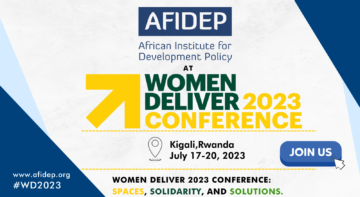Actualités

Climate change, environment and biodiversity change-makers will be coming together in Bangkok, Thailand for the Prince Mahidol Award Conference (PMAC) 2023. PMAC 2023Population is an annual global multi-stakeholder convening where stakeholders come together for dialogue and engagements geared towards scaling up efforts to tackle the triple threats of climate change, biodiversity loss, and pollution.
The theme for the PMAC 2023 ‘Setting a New Health Agenda: At the Nexus of Climate Change, Environment, and Biodiversity.’
The BUILD Project, led by AFIDEP and partners FHI360, PFPI, LEAD SEA and PACJA is convening a side session (SMB209) at PMAC 2023 titled ‘Overcoming Challenges and Harnessing Opportunities for Health at the Nexus of Biodiversity and Climate Change: Global Lessons from Cross Sectoral Population-Environment-Development (PED) Approaches.’
The side session will provide a platform for discussing and illustrating the role of PED approaches in addressing the interlinkages between health, biodiversity and climate change in Low and Middle-Income Countries (LMICs). The BUILD delegation will include Dr. Eliya Zulu, Executive Director, AFIDEP; Dr. Joan Castro, Executive Director, PFPI Inc; Lindsay Swisher, Public Health Specialist, USAID; Clive Mutunga, Project Director, BUILD Project; Dr. Bernard Onyango, Senior Research Analyst, AFIDEP and Edith Ngunjiri, Technical Advisor, Health & Environment Partnerships, Blue Ventures.
| Tuesday, January 24, 2023
0900 – 1230 hrs BKK Side meeting code: SMB209 Venue: Lotus Suite 10 |
Overcoming Challenges and Harnessing Opportunities for Health at the Nexus of Biodiversity and Climate Change: Global Lessons from Cross Sectoral Population-Environment-Development (PED) Approaches
Speakers: Dr. Eliya Zulu, Dr. Joan Castro, Dr. Bernard Onyango, Lindsay Swisher, Edith Ngunjiri Moderator: Clive Mutunga |
The BUILD Project premises that the challenges around the climate change, biodiversity loss, and environment nexus are complex, interconnected and cut across sectoral, disciplinary, geographical and cultural boundaries. As such, they require collaborative solutions through cross-sectoral integrated approaches such as Population-Environment-Development (PED).
PED approaches take a holistic and integrated approach to health and the environment, recognizing the connections between the health and well-being of both people and the environment and natural resources that they depend on. Integrating health, including voluntary family planning, with initiatives that strengthen environmental sustainability and increase resilience to climate change can achieve health, environment and other development outcomes that are far greater than in individual single-sector interventions alone.
Related Posts




